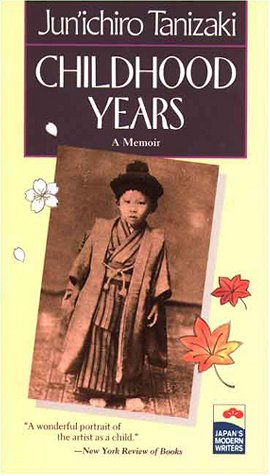Items related to Childhood Years: A Memoir (Japan's Modern Writers)

The genres he worked in were also extremely varied: the short story, the novella, the long novel, the drama, and the essay. Within the last category, Tanizaki produced several notable collections of reminiscences--it was as if, after establishing the right of an author to be unrepentingly fictional, he then felt free to train his talents on his own life. Especially in his later years, as he entered his seventies, he looked back on the world of late nineteenth-century Japan--focusing on that modest, close-knit section of Tokyo, with its small shops and family businesses, in which he grew up--and Childhood Years is the result. The main themes of his fiction are echoed in this memoir, with its central figure of his mother, and its foreshadowings of other, more ambiguous feminine presences--murderesses and victims, geisha and "archery-booth girls," and (most ambiguous of all) the male actors who play female roles on the Kabuki stage.
If the well-known Kabuki is here, so too are forms that will be less familiar to Western readers: the sacred kagura dances and the burlesque chaban. Japanese literature is represented, from age-old, half-legendary chronicles through medieval warrior tales, and on to the political novels of the turn of the century. Above all, though, the men and women of Meiji Japan are here, the little known, the famous, and the notorious. All are depicted with the acute observation and vividness of expression so characteristic of Tanizaki. The result is a nostalgic record of great beauty and power, shot through with flashes of the author's rather macabre humor and delight in the grotesque.
"synopsis" may belong to another edition of this title.
He married three times; his third wife, Matsuko, shared the last thirty years of his life. Even in his seventies he was still startling readers with audacious fiction like The Key and Diary of a Mad Old Man, and a year before his death in Atami in 1965 he was elected to the American Academy and Institute of Arts and Letters, the first Japanese to be so honored.
Translations of his work began to appear as early as 1917, and by now his novels have been published in at least twenty different languages. Donald Keene's assessment appears to be coming true: "It is likely that if any one writer of the period will stand the test of time and be accepted as a figure of world stature, it will be Tanizaki."
Paul McCarthy, Professor of Comparative Cultures at Surugadai University, has translated Tanizaki's "The Little Kingdom," "Professor Rado," The Gourmet Club, and A Cat, a Man, and Two Women, which won the Japan-America Friendship Commission Prize. He has also translated Takeshi Umehara's Lotus and Other Tales of Medieval Japan and Zenno Ishigami's Disciples of the Buddha.
Only then did I notice my mother: had she been with me all along, or had she only now caught up with me? I found her hugging me tightly as we stood there together. The first violent up-and-down movement had ceased, but the ground was still undulating in great, slow waves. From where we stood huddling together, the surface of Ningyo-cho Avenue about one block away seemed to rise and sink, over and over again. My face was pressed against my mother. Her kimono had come open at the neck, and the whiteness of her breasts blocked the fearful scene before me. Suddenly I became aware that I had a writing brush gripped tightly in my right hand. (I had, I know, been eating an ice when the earthquake came and, throwing it down, had dashed out of the house. How, then, did this brush come to be in my hand? Why had I picked it up, and when?...) As we stood in the middle of the intersection, holding on to one another as we swayed back and forth, I began to move the brush, tracing lines in black ink upon my mother's breasts.
"About this title" may belong to another edition of this title.
- PublisherKodansha Amer Inc
- Publication date1998
- ISBN 10 4770023227
- ISBN 13 9784770023223
- BindingPaperback
- Number of pages196
- Rating
Shipping:
US$ 4.75
Within U.S.A.
Top Search Results from the AbeBooks Marketplace
Childhood Years: A Memoir (Japan's Modern Writers)
Book Description Paperback. Condition: Very Good. A trade paperback in excellent condition, clean with a tight binding and an unmarked text.From a private smoke free collection.Shipping within 24 hours, with a tracking number and delivery confirmation. Seller Inventory # StoneGBox86-723r
Childhood Years: A Memoir (Japan's Modern Writers)
Book Description Trade Paperback. Condition: Very Good. Dust Jacket Condition: Very Good. Reissue. xiii, 182 pp. First printing thus. Some pages are creased at the tips of the fore-corners from having been dog-eared. The binding is tight and square, and the text is clean. Translated from the Japanese by Paul McCarthy. Seller Inventory # 071809
Childhood Years: A Memoir
Book Description Soft cover. Condition: Fine. Dust Jacket Condition: Fine. 1st Edition. First edition, first printing (full number line) of this 1998 soft cover. Text is clean and unmarked, binding tight, no indications of previous ownership. This soft cover has a DJ that is unclipped and in excellent condition. Seller Inventory # 002631
Childhood Years: A Memoir (Japan's Modern Writers)
Book Description paperback. Condition: Gut. 196 Seiten; 9784770023223.3 Sprache: Deutsch Gewicht in Gramm: 500. Seller Inventory # 562660

